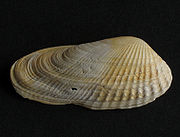
False angelwing
Encyclopedia
Petricolaria pholadiformis, common name
s "false angel wing" (USA) and "American piddock" (UK), is a species
of saltwater clam
, a marine
bivalve mollusk in the family Petricolidae
, which is related to the large family Veneridae
, the Venus clams.
), the main distinguishing feature being that it lacks the apophyses, the spoon-shaped wings located near the beak, of the real angel wing. It grows to about 5 centimetres (2 in) long and is usually white. The anterior end is extended and has a rounded point while the posterior end is blunt and curved. There are ridges radiating from the beak, which are more pronounced at the posterior end, and fainter growth rings running parallel with the margin.
including the Gulf of Mexico
.
, and on the West Coast
of North America
.

Common name
A common name of a taxon or organism is a name in general use within a community; it is often contrasted with the scientific name for the same organism...
s "false angel wing" (USA) and "American piddock" (UK), is a species
Species
In biology, a species is one of the basic units of biological classification and a taxonomic rank. A species is often defined as a group of organisms capable of interbreeding and producing fertile offspring. While in many cases this definition is adequate, more precise or differing measures are...
of saltwater clam
Clam
The word "clam" can be applied to freshwater mussels, and other freshwater bivalves, as well as marine bivalves.In the United States, "clam" can be used in several different ways: one, as a general term covering all bivalve molluscs...
, a marine
Marine (ocean)
Marine is an umbrella term. As an adjective it is usually applicable to things relating to the sea or ocean, such as marine biology, marine ecology and marine geology...
bivalve mollusk in the family Petricolidae
Petricolidae
The Petricolidae is a family of bivalves related to the large family Veneridae or Venus clams. Some authors include these genera within the Veneridae as the subfamily Petricolinae.-Genera and species:Genera and species in the family Petricolidae include:...
, which is related to the large family Veneridae
Veneridae
The Veneridae or venerids, also known as the Venus clams, are a very large family of minute to large, saltwater clams, marine bivalve molluscs. There are over 500 living species of venerid bivalves, most of which are edible, and many of which are exploited as a food source.Many of the most...
, the Venus clams.
Description
Petricolaria pholadiformis closely resembles the angel wing (Cyrtopleura costataCyrtopleura costata
Cyrtopleura costata or the angel wing clam is a bivalve mollusc in the family Pholadidae. It is found in shallow parts of the north west Atlantic living in the seabed where it burrows through sand and mud to a depth of up to .-Description:...
), the main distinguishing feature being that it lacks the apophyses, the spoon-shaped wings located near the beak, of the real angel wing. It grows to about 5 centimetres (2 in) long and is usually white. The anterior end is extended and has a rounded point while the posterior end is blunt and curved. There are ridges radiating from the beak, which are more pronounced at the posterior end, and fainter growth rings running parallel with the margin.
Indigenous
This species is native to the Eastern Coast of North AmericaNorth America
North America is a continent wholly within the Northern Hemisphere and almost wholly within the Western Hemisphere. It is also considered a northern subcontinent of the Americas...
including the Gulf of Mexico
Gulf of Mexico
The Gulf of Mexico is a partially landlocked ocean basin largely surrounded by the North American continent and the island of Cuba. It is bounded on the northeast, north and northwest by the Gulf Coast of the United States, on the southwest and south by Mexico, and on the southeast by Cuba. In...
.
Introduced
This clam was introduced and has become established in the British IslesBritish Isles
The British Isles are a group of islands off the northwest coast of continental Europe that include the islands of Great Britain and Ireland and over six thousand smaller isles. There are two sovereign states located on the islands: the United Kingdom of Great Britain and Northern Ireland and...
, and on the West Coast
West Coast of the United States
West Coast or Pacific Coast are terms for the westernmost coastal states of the United States. The term most often refers to the states of California, Oregon, and Washington. Although not part of the contiguous United States, Alaska and Hawaii do border the Pacific Ocean but can't be included in...
of North America
North America
North America is a continent wholly within the Northern Hemisphere and almost wholly within the Western Hemisphere. It is also considered a northern subcontinent of the Americas...
.

External links
- Image of live individual at: http://www.elkhornslough.org/research/aquaticinvaders/aquatic17.htm

